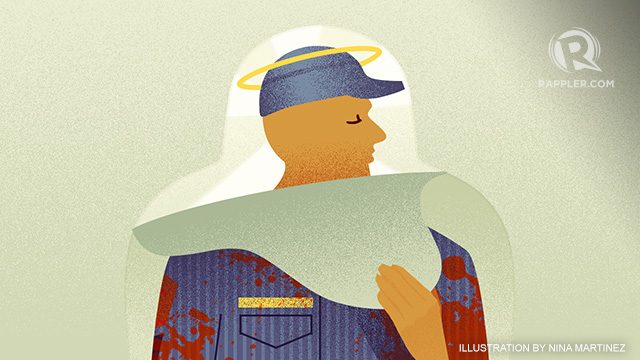SUMMARY
This is AI generated summarization, which may have errors. For context, always refer to the full article.
![[Newspoint]: Back to war](https://www.rappler.com/tachyon/r3-assets/612F469A6EA84F6BAE882D2B94A4B421/img/D50E797189D44466921883A2E35102A0/vergel-santos-headshot-150px.jpg)
In a mere month the police, supposedly, have succeeded in cleansing their institution and making their men and women morally and professionally fit to return to their war on drugs. Even after the war was called off – at more than 7,000 dealers and users killed in seven months – the killings have continued, although at a slower rate, if that is any consolation.
To be fair, the police did admit to cases of corruption and abuse in their prosecution of the war and stopped it precisely to give themselves time to reform. I am for giving second chances, or third or more. But re-mounting the war so quickly prompts doubts about how sincere the police really are with their purge, not to mention their purpose.
The Church, which has been asked by the national police chief himself, General Ronald de la Rosa, to second prelates to the war effort so that its righteous pursuit may be ensured this time around, is not impressed; it is afraid to be used.
But the very profession whose most useful virtue as watchdog is skepticism appears taken by mere promise and platitude. Recent days have seen police officials all over the media promoting a new “benign” war. How benign exactly?
One of these officials, for what clarity he could provide, said the new war was less about killing than about rehabilitation – “focused on high-value targets.” If the official was referring to big-time drug suppliers and dealers, why were hardly any of them caught, dead or alive, in all those 7 months of the old war, a war that yielded billions of pesos worth of drugs, according to the police? I recall the biggest haul at the time, and possibly to this day, off the Zambales coast: not a single arrest accompanied or followed it.
The question was not answered; in fact it was not asked. Many in the media seem only too willing to give the police generous time and space for their spiels with few prying questions. Quite unmistakably, the police have launched a public-relations campaign, but, emerging out of their war so badly damaged, they cannot expect to even begin to be redeemed by PR, not even with the help of the media.
And the media themselves should have known better. They should have been more diligent, more probing, more adversarial, less friendly, in the interest of the public they have sworn to watch over – a public nine in ten of whom have expressed in a recent poll the fear that they, or people they know, might end up victims themselves, intended or collateral, of the “extrajudicial killings” – summary executions – associated with the war on drugs.

Number one coddler
One test of credibility is how the police deal with their own wrongdoers.
President Duterte is in fact their number one coddler, heard repeatedly to make avowals of faith in them and to promise them support and protection. He did make a fine show of fury at their wrongdoing, but still he would not bring down the full force of the law on them; he in fact ignores the law and makes the, again, PR point that his own manner of dealing justice is swifter: instead of hauling the scallywags to jail and court, he exiles them to Basilan. In Basilan, the law is constantly challenged, but police exiles can always sit out their terms out of sight.
Before Basilan exile became an option there had been “restrictive custody.” The new police coinage has not been credibly explained: Is a detainee allowed to go home at the end of the day, or take a periodic leave? The general idea is understood as confinement to camp.
But what in it exactly constitutes punishment? Condemnation to idleness and boredom, the adult equivalent of standing in a corner? Remember those push-ups for coup plotting in President Ramos’s time?
Restrictive custody seems to me just another shortcut, and one not unlike extrajudicial killing, except that extrajudicial killing is despotic, restrictive custody paternalistic. I recall an illustrative exchange I had with the commander of Duterte’s cyber troops. Lecturing me on hyperbole as a regular feature of his boss’s speech, Pompee La Viña gives an example, the easier for me to get it: A parent warns a son in mortal exasperation, “I will kill you!” and yet the son lives. But, I point out, the President says he will kill and thousands die. Obviously, the double standard is defined by the subject – spoiled son or drugged non-kin.
All I’m saying is let’s not allow ourselves to be easily persuaded that the police are reformed and that their prejudicial application of the law is a thing of the past – a thing of the old war. But the law does not operate that way, only humans do – humans so powerful they are able to put themselves above the law. – Rappler.com
Add a comment
How does this make you feel?
There are no comments yet. Add your comment to start the conversation.